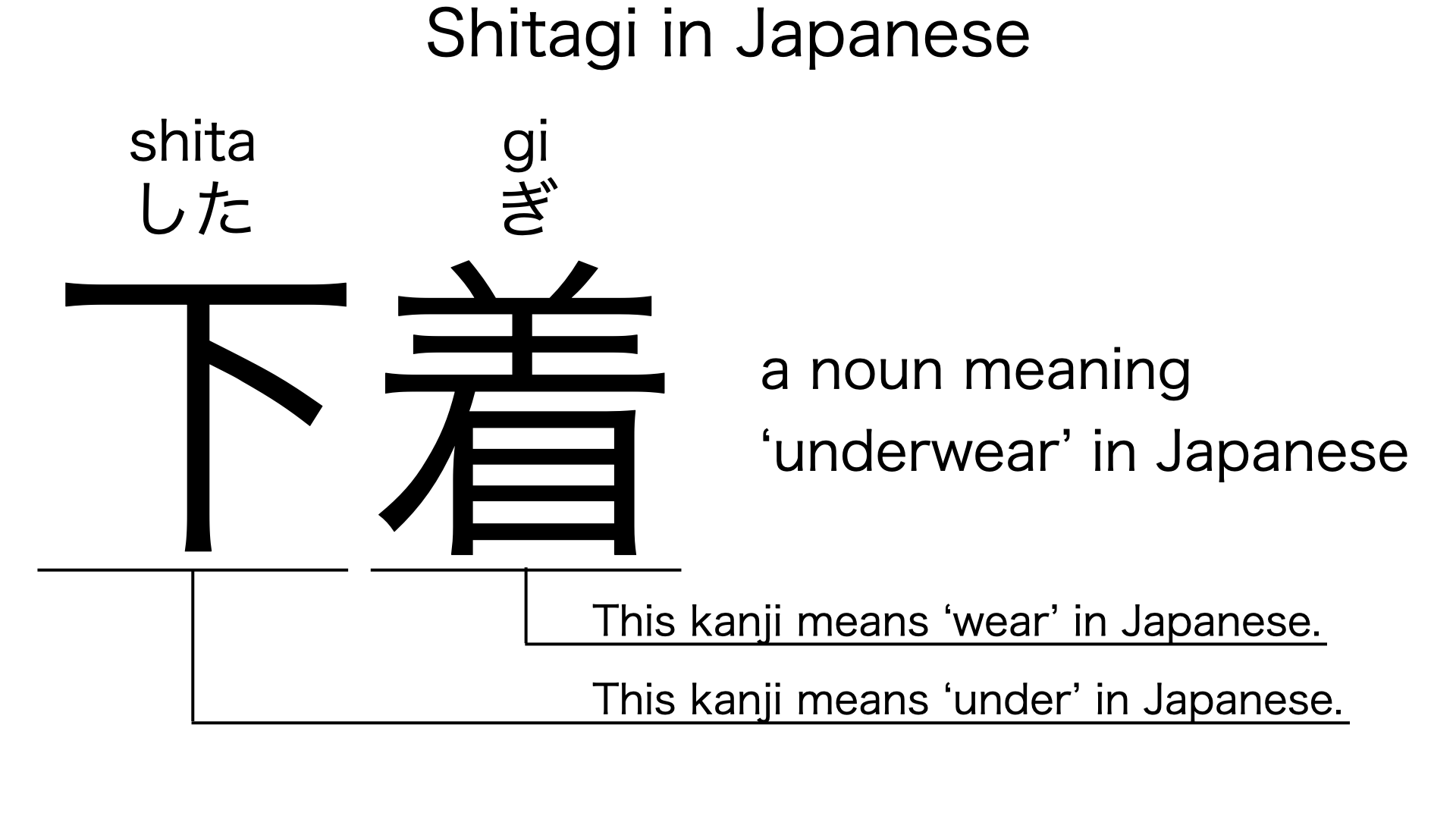What does “shitagi” mean in Japanese?
Native speakers say “shitagi” to mean ‘underwear’ in Japanese. Perhaps, some Japanese learners know this word as it is sometimes used in Japanese movies, novels, manga, anime, and the like. In this blog post, however, I will explain this word in detail based on its kanji expression. And also, I will explain how to use it through example sentences. My explanations would help Japanese learners understand “shitagi” more clearly. Then, let’s get started!
Contents
Definition and meaning of “shitagi”
Let me start with the definition and meaning of “shitagi”.
- shitagi – 下着 (したぎ) : a noun meaning ‘underwear’ in Japanese.
The definition and meaning are simple and clear. To understand this noun more clearly, however, let me explain its kanji characters in detail, one by one.
What does “shitagi” literally mean in Japanese?
The kanji expression of “shitagi” consists of the following two kanji characters:
- 下 : a kanji character sometimes used to mean ‘under’ in Japanese.
- 着 : a kanji character sometimes used to mean ‘wear’ in Japanese.
From these two kanji characters, we can understand that “shitagi” literally means ‘underwear’ in Japanese. What the kanji characters express is completely in line with the actual meaning.

When we meet new kanji expressions, we should check their kanji characters in detail to understand their meanings clearly and deeply. In many cases, kanji characters tell us a lot about the meanings of the expressions they form. Actually, here, we could get the better understanding of “shitagi” through the detailed kanji check above.
So far, I’ve explained the definition and meaning of “shitagi” together with its kanji characters. Then, let me explain how to use it through the example sentences below.
Example #1: how to say “underwear” in Japanese
boku wa atarashii shitagi wo kat ta – 僕は新しい下着を買った (ぼくはあたらしいしたぎをかった)
I bought new underwear.
Below are the new words used in the example sentence.
- boku – 僕 (ぼく) : a pronoun meaning ‘I’ in Japanese. This is used mainly by boys and young males.
- wa – は : a binding particle working as a case marker or topic marker. In the example, this works after “boku” to make the subject in the sentence.
- atarashii – 新しい (あたらしい) : an i-adjective meaning ‘new’ in Japanese.
- wo – を : a case particle used to make the object word in a sentence. In the example, this is used after “atarashii shitagi” to make the object in the sentence.
- kat – 買っ (かっ) : one conjugation of the verb, “kau“, which means ‘to buy’ in Japanese. In the example, it has been conjugated for the better connection with its following word.
- ta – た : an auxiliary verb used after a verb, adjective, or auxiliary verb to make its past tense form. In the example, this is used after “kat” to make its past tense form, “kat ta”.
This is a typical usage of “shitagi”. In this example, it works together with the i-adjective, “atarashii”, to mean ‘new underwear’ in Japanese.
Example #2: another usage of “shitagi”
watashi wa kawaii shitagi ga suki desu – 私は可愛い下着が好きです (わたしはかわいいしたぎがすきです)
I love cute underwear.
Below are the new words used in the example sentence.
- watashi – 私 (わたし) : a pronoun meaning ‘I’ in Japanese.
- kawaii – 可愛い (かわいい) : an i-adjective meaning ‘cute’ in Japanese.
- ga – が : a case particle used to make the subject word or the object word in a sentence. In the example, this is used after “kawaii shitagi” to make the object in the sentence.
- suki – 好き (すき) : the stem part of the na-adjective, “sukina”, which means ‘favorite’ in Japanese. Native speakers, however, often use this as an individual word to mean ‘to like’ or ‘to love’ in Japanese. In the example, this is used to mean ‘to love’ in Japanese.
- desu – です : an auxiliary verb used after a noun or adjective to make it polite. Probably, this is well known as a part of Japanese desu form. In the example, this is used after “suki” to make it sound polite.
This is another typical usage of “shitagi”. In this example, it works together with the i-adjective, “kawaii”, to mean ‘cute underwear’ in Japanese. When we want to mean ‘underwear’ in Japanese, anyway, this noun is always a very good option.
Summary
In this blog post, I’ve explained the definition and meaning of “shitagi” in detail based on its kanji expression. And also, I’ve explained how to use it through the example sentences. Let me summarize them as follows.
- shitagi – 下着 (したぎ) : a noun meaning ‘underwear’ in Japanese. These two kanji characters literally mean ‘underwear’ in Japanese. What the kanji characters express is completely in line with the actual meaning.
Hope my explanations are understandable and helpful for Japanese learners.
Leave a Reply